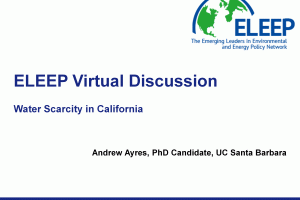This ELEEP Virtual Discussion took place on September 18th, 2016. We were joined by Andrew Ayres to discuss the topic of water scarcity in California. We explore why California's critically overused groundwater basins have had trouble addressing declining water levels, and we find that bargaining costs resulting from numerous, highly heterogeneous users complicate agreement over the form of stringent management measures, sometimes blocking their adoption altogether. The event was moderated by Max Gruenig, President of Ecologic Institute US (max.gruenig@eius.org).
In California, a prolonged drought has increased concern over observed groundwater depletion. However, declining groundwater tables are not new, and signs of degradation have been conspicuous in some basins for decades. Meanwhile, collective responses by users have not been uniform: some groups have undertaken costly court-led adjudication to define property rights, while others have done little. We examine the institutions governing California’s groundwater basins to explain the adoption and nature of controls. We find that users adopt stringent institutions where aggregate resource benefits exceed bargaining costs—costs which result from numerous users with heterogeneous resource access and water valuations. In extreme cases, bargaining costs block management responses altogether.
Andrew Ayres is a PhD candidate at UC, Santa Barbara. His research concerns the economics of river basin management, and the primary focus is on the formulation and impact of legal and economic institutions that encourage sustainable and efficient water use. Andrew's current work examines institutions for groundwater management, specifically the conditions under which property rights are adopted. The goal of this project is to inform the implementation of California's Sustainable Groundwater Management Act, which may entail management changes in critical basins throughout the state. Previously, Andrew was a Fulbright Fellow and thereafter worked at Ecologic Institute in Berlin, Germany.






